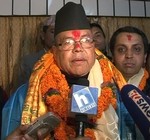The election of a Prime Minister in Nepal after a seven-month delay, and the termination of the UN Mission supervising the weapons deposited by the members of the People’s Liberation Army, is a development of singular significance for India.
Jhalanath Khanal, chairman of the leftist Communist Party of Nepal, became Nepal’s third Prime Minister since it became a republic in 2008.
He did so with the support of the Maoists, after a detailed agreement which included rotating the Prime Ministership between the Maoists and a common minimum programme, including an understanding to create a separate force from among the PLA combatants. However, this arrangement began to unravel almost immediately upon talks with the Maoists about government formation began. The Maoists have withdrawn from participation in the government, though their offer of outside support will allow Khanal to set up a new government. The bone of contention is control over the former combatants, which the Maoists had hoped to obtain by being given the Home Ministry.
Although Khanal is well aware of how fragile outside support is, he could not overlook the rejection of the “separate force” concept by all the other political parties, including his own. The idea that an India-style, Border Security Force (BSF) could “guard” the porous border between India and Nepal, is anathema to India. It has implications for the inspiration and support that a Maoist-Communist combine in Nepal gives to Naxalite forces in India. Combined with the support extended for decades by Pakistan to Islamic militants, a coming-together of these two groups of militants would seriously worsen India’s internal security situation, despite recent improvements in the North East flowing out of India’s efforts with Myanmar and the maturity of the government in Bangladesh.
 Installing posters for the CPN(M) party in Thamel, Nepal.
Installing posters for the CPN(M) party in Thamel, Nepal.Nepal has served as, and exploited its role of, a buffer between India and China since India’s independence in 1947. China has leaned on successive Nepali governments to curtail the activities of Tibetan refugees in Nepal. Apart from security considerations, for India relations with Nepal are sensitive for a variety of other reasons including hydro power and smuggling including of arms and counterfeit currency. Then there are the related Gorkhaland issues as well as the large Nepali origin population and its presence in the Indian army, to keep in mind.
In retrospect, India’s decision to facilitate the abolition of the Nepali monarchy and the entry of the Maoists into government, as also the termination of the UN’s mandate in Nepal, are beginning to look like serious misjudgments. New Delhi needs to deal with the Gorkhaland issue expeditiously, by separating it from its differences with the CPM government in West Bengal. It must also work at mitigating the anti-India streak that infects Nepali politics and popular perceptions.
How long the Khanal government survives, and the eventual composition of its successor, needs to be watched carefully. New Delhi must hedge its bets and immediately commence overtures to the various other political forces in Nepal.
Neelam Deo is Co-founder and Director, Gateway House: Indian Council on Global Relations; She has been the Indian Ambassador to Denmark and Ivory Coast; and former Consul General in New York.
This article was exclusively written for Gateway House: Indian Council on Global Relations. You can read more exclusive content here.
For interview requests with the author, or for permission to republish, please contact outreach@gatewayhouse.in.
© Copyright 2011 Gateway House: Indian Council on Global Relations. All rights reserved. Any unauthorized copying or reproduction is strictly prohibited.


